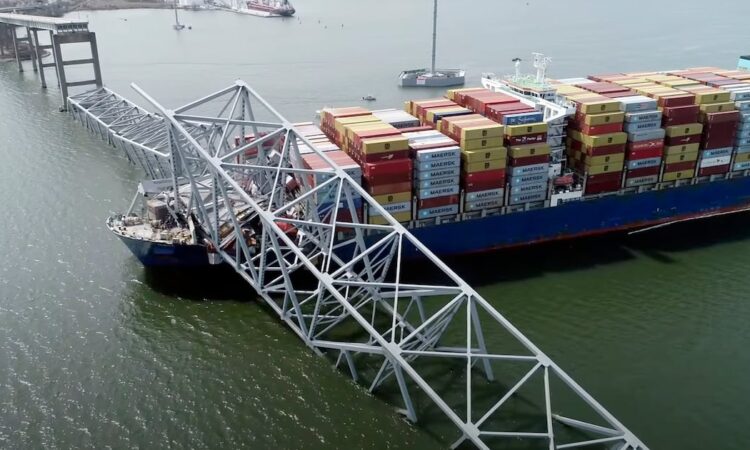
After the collapse of Baltimore’s Francis Scott Key Bridge this week, questions remain on the effect its absence will have on the city and regional and global supply chains.
Maryland Governor Wes Moore on Tuesday stressed the economic impact after the collapse, saying the port indirectly employs more than 100,000 people and imports about 51 million tonnes of foreign cargo.
More vehicles and agricultural equipment pass through Baltimore’s port than any other in the US, Mr Moore said.
“Between $100 million and $200 million of value comes through port every day and about $2 million in wages are at stake every day and that’s one of the areas we’re most concerned about,” Transport Secretary Pete Buttigieg said on Wednesday.
The port is not the largest on the East Coast but it is closer to the Midwest region, known for its vehicle production, than any other and the ripple effects on the industry could last for months.
According to the Maryland government, it is the ninth largest US port for processing international cargo.
But experts say that while it is sure to have an effect on the economy of the city and the state, it is unlikely to have a large impact on the wider US economy.
“We don’t anticipate that the disruptions to trade or transportation will be visible in US GDP [gross domestic product], and the implications for inflation are minimal,” independent economic advisory company Oxford Economics said in a release.
It noted that while “there will likely be some temporary disruptions to certain industries, including auto makers”, they would probably do little to affect the overall economy.
“A prolonged disruption could lengthen delivery times more than we anticipate and enough to leave a mark on our US supply-chain stress index via the transportation or pricing components,” the report said.
Witnesses heard loud boom before ship struck bridge in Baltimore – video
Witnesses heard loud boom before ship struck bridge in Baltimore

The port has also become increasingly important to US retailers and manufacturers seeking to diversify their supply networks and bring goods closer to customers, Jonathan Gold, a vice president at the National Retail Federation, told AP.
“Everybody is trying to figure out the impact of the supply chain” from the loss of the bridge, said Mr Gold.
In addition to its importance to US trade, the Baltimore port is also key to international commerce. It is one of the biggest US ports for coal exports and also exports liquefied natural gas to Europe.
The bridge collapse is a “stark reminder” of the fragility of US infrastructure, said Christian Roeloffs, cofounder and chief executive of Container xChange, an online global container logistics platform.
“As we navigate the aftermath, we are reminded that the container logistics industry centres around the critical need for robust risk management and resilience in supply chain operations,” Mr Roeloffs said.
“This incident serves as a reminder that infrastructure vulnerabilities can lead to disruptions, and being prepared with flexible, adaptive strategies is essential for maintaining continuity in the face of challenges.”
Francis Scott Key Bridge collapse in Baltimore – in pictures
The incident comes amid rising pressure on the shipping industry as attacks by Yemen’s Houthis continue to force ships to take longer routes around the Horn of Africa to avoid the Red Sea.
Most recently, at the weekend, a Chinese commercial ship crossing the area was hit by a barrage of Houthi missiles.
This, in addition to continuing bottlenecks in the Panama Canal, could lengthen delivery times and increase costs for companies.
“The pause in maritime traffic at the Port of Baltimore adds one more point of pressure for trade in the region,” Simona Stan, professor of marketing at the University of Montana, wrote in The Conversation.
“This may lead more shippers that have a choice to send more freight through West Coast ports, which have not suffered much from the Red Sea attacks and Panama problems.”
Unlike the Red Sea attacks and the Covid-19 pandemic, however, she projected the fallout from the bridge collapse will be temporary.
“From a supply chain perspective, this was a freak accident. It’s dramatic, it’s graphic, and it forces people to pay attention to the issue,” Ms Stan wrote.
Updated: March 27, 2024, 8:01 PM






